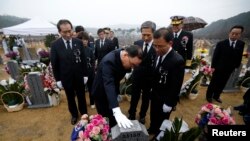The International Criminal Court (ICC) says it will not formally investigate two North Korean attacks against South Korea in 2010 because civilians were not purposely targeted.
The court had opened a preliminary probe into the two Yellow Sea incidents, which together killed 50 people. But prosecutor Fatou Bensouda determined there wasn’t enough evidence to initiate a full investigation.
The Hague-based ICC primarily rules on cases of genocide, crimes against humanity and war crimes.
In March 2010, North Korea torpedoed and sank a South Korean warship, the Cheonan, killing 46 sailors. That November, North Korea shelled South Korea’s Yeonpyeong Island, killing two military personnel and two civilians.
In December 2010, the international tribunal began exploring whether the incidents constituted war crimes, which fall under its jurisdiction.
The tribunal concluded the attack on the Cheonan “was directed at a lawful military target and would not otherwise meet the definition of the war crime” as defined in the Rome Statute.
It also said that while the Yeonpyeong Island shelling resulted in civilian casualties, North Korea’s government had not provided enough information to determine whether the attack was "intentionally directed against civilian objects or that the civilian impact was expected to be clearly excessive in relation to the anticipated military advantage.”
Of the 230 shells fired by North Korea, about 30 landed in residential areas on the island.
While Bensouda concluded there is no reasonable basis to initiate an investigation, the ICC warned it could resume the preliminary examination in light of new facts or evidence.
But Heo Man-ho, a professor at South Korea’s Kyungpook National University, said an ICC investigation into the attacks is still feasible with the help of the United Nations Security Council.
"Although North Korea is not a party to the ICC, it can be subject to an investigation if the Security Council passes a resolution,” Heo said.
He blamed China and Russia for blocking any action against Pyongyang.
North and South Korea remain technically at war because fighting on the peninsula was ended by an armistice in 1953.
This report was produced in collaboration with the VOA Korean service. Reuters news service contributed.
The court had opened a preliminary probe into the two Yellow Sea incidents, which together killed 50 people. But prosecutor Fatou Bensouda determined there wasn’t enough evidence to initiate a full investigation.
The Hague-based ICC primarily rules on cases of genocide, crimes against humanity and war crimes.
In March 2010, North Korea torpedoed and sank a South Korean warship, the Cheonan, killing 46 sailors. That November, North Korea shelled South Korea’s Yeonpyeong Island, killing two military personnel and two civilians.
In December 2010, the international tribunal began exploring whether the incidents constituted war crimes, which fall under its jurisdiction.
The tribunal concluded the attack on the Cheonan “was directed at a lawful military target and would not otherwise meet the definition of the war crime” as defined in the Rome Statute.
It also said that while the Yeonpyeong Island shelling resulted in civilian casualties, North Korea’s government had not provided enough information to determine whether the attack was "intentionally directed against civilian objects or that the civilian impact was expected to be clearly excessive in relation to the anticipated military advantage.”
Of the 230 shells fired by North Korea, about 30 landed in residential areas on the island.
While Bensouda concluded there is no reasonable basis to initiate an investigation, the ICC warned it could resume the preliminary examination in light of new facts or evidence.
But Heo Man-ho, a professor at South Korea’s Kyungpook National University, said an ICC investigation into the attacks is still feasible with the help of the United Nations Security Council.
"Although North Korea is not a party to the ICC, it can be subject to an investigation if the Security Council passes a resolution,” Heo said.
He blamed China and Russia for blocking any action against Pyongyang.
North and South Korea remain technically at war because fighting on the peninsula was ended by an armistice in 1953.
This report was produced in collaboration with the VOA Korean service. Reuters news service contributed.





